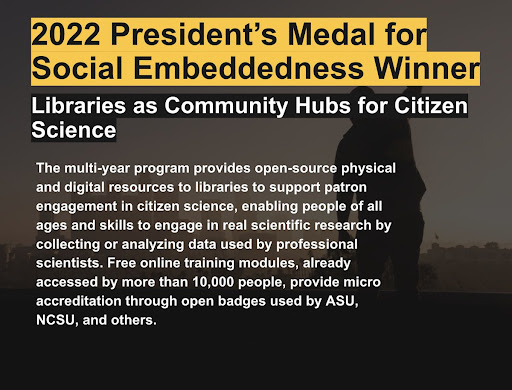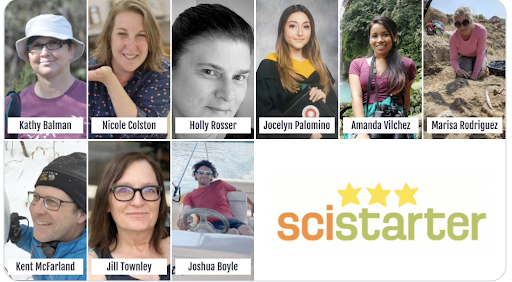
As 2022 draws to a close, we’re looking back at a year filled with exploration and engagement, made possible by our growing network of more than 150,000 members.
More than 500 citizen science projects were added to SciStarter in 2022 alone. This reflects the growing need for scientists to collaborate with the public to answer important questions they cannot (and should not) answer alone. When we are all involved in research and discovery, the science is better.
Millions of Data Contributions
SciStarter members and other visitors to the site made a whopping 2.4 million data contributions to our Affiliate projects this year, representing crucial data points for scientists. That’s combined with millions of visits this year to SciStarter.org. Our partners, including Verizon and the Girl Scouts, also helped out in a big way this year. Verizon volunteers alone made 350,000 data contributions to Affiliate projects on SciStarter and thousands of Girl Scout troops participated in the Girl Scouts programs including the Think Like a Citizen Scientist Journey, Tree Promise and Climate Challenge.
Ninety-two partners added 234 events to the SciStarter calendar this year. Combined with new projects, that means 777 projects and events were added in 2022, nearly double the number of projects and events added in 2021!
We also hit 150,000 members this year — a 25 percent increase in registered, active members compared to last year. That’s on top of a 20 percent growth in members during 2021!
In 2022, we also had more than 12,000 lifelong learners complete at least one training module on SciStarter. And we added new modules on building data literacy data literacy through community and citizen science and teaching in higher education with citizen science, continuing to grow our suite of free training courses.
The trainings are linked to open badges that validate the skills and competencies each training delivers. We’re thrilled about this direction partly because we’ve long envisioned a way to translate all the wonderful informal citizen science experiences into a formal accreditation. We are partnering with Arizona State University and North Carolina State University to pilot some exciting approaches. Stay tuned!
Expanding Outreach
SciStarter continued our outreach efforts this year, communicating with citizen scientists, project leaders, affiliated organizations and the general public across multiple channels. As always, our goal is to connect with people where they are to help them easily find opportunities to take action on issues they are concerned or curious about.
Our blog posts, shared both on SciStarter and in the Citizen Science Salon blog on Discover magazine, and featuring deeper dives into projects, insightful stories about projects and important outcomes, reached thousands of readers. The monthly SciStarter podcast surpassed 10,000 downloads this year as we expanded our library of in-depth interviews with scientists and volunteers. Our twice-monthly newsletter promoting projects, partners, events and more now reaches almost 70,000 subscribers, and our social media posts on Facebook, Twitter and Instagram with calls to action, news and more are now broadcast to thousands more. And on YouTube, viewers can find How To videos from project scientists and recordings of past webinars and more.
SciStarter LIVE!
One of our most fun new initiatives this year is SciStarter LIVE!, which features free, weekly, real-time webinars featuring citizen science projects and co-hosted by a few new members of the SciStarter team along with scientists and event organizers. Our LIVE! events so far have featured the North American FungiQuest, the Christmas Bird Count, our first-ever Arabic-language event and more. Join us on any Tuesday at 2pm ET for these interactive events!
SciStarter benefits everyone. Participants learn new skills, connect with others, deepen their understanding of the world and advance important research, while project leaders are able to recruit more participants through SciStarter and learn more about their volunteers with our free tools. Facilitators get access to a diverse platform to share citizen science projects with their communities, track and support progress and award badges, credits and recognition and researchers are able to access unprecedented data on a broad landscape of citizen science projects and the ways people engage with the field.
Speaking of research, SciStarter played an important role this year in multiple studies of the ways volunteers interact with citizen science projects, how they advance science and what they learn in the process. One study published in July in the journal BioScience found that many people participate in several projects (which we always suspected!) and some are incredible “super participants.” The study analyzed people who did more than one project — which was many citizen scientists — to gather insights about how to broaden participation. And another study, to be published soon in the journal PeerJ, builds on that work by exploring the connection between projects on SciStarter and the ways that volunteers move between projects.
Citizen Science Month 2022
Our annual Citizen Science Month, held each year in April, was also a success in 2022. We had 114 different events held across the world, reaching hundreds of thousands of people, many for the first time. Our social posts during April reached more than 690,000 people, and SciStarter’s free resources for project leaders and event organizers were downloaded almost 19,000 times — about 4,000 more downloads than in 2021. We’re also very excited to announce that the National Library of Medicine has committed to support the next FOUR years of Citizen Science Month with a grant to Arizona State University and SciStarter!
The month also featured some exciting collaborations, like a social media takeover with the National Science Foundation, and events with NASA scientists. One of our events even featured Benjamin Franklin, one of our nation’s Founding Fathers and an ardent citizen scientist. We partnered with PBS Books and PBS NewsHour Student Reporting Labs to present “Benjamin Franklin and Citizen Science: Sharing Stories of Collective Impact,” which also featured a sneak peek at the new Ken Burns documentary on Franklin.
Finally, there are two more exciting updates to share as we close out the year. First, SciStarter’s Libraries as Community Hubs for Citizen Science program received Arizona State University’s President’s Medal for Social Embeddedness!!!
The award recognizes ASU members (like our founder, Darlene Cavalier, an ASU professor of practice at the School for the Future of Innovation in Society) who have taken ASU’s work and applied it to surrounding communities in a way that betters society.

Second, and, this is our favorite update, after nearly a decade of grassroots, bootstrapping, and volunteering efforts, SciStarter is in a position to support others around us. Meet the nine inaugural winners of our new SciSTARter Boost award. Recognized as stars in citizen science, these individuals are helping others engage in science in a meaningful way. SciStarter has awarded each of them $2,000 to support their important work, no strings attached.

We look forward to ringing in 2023 with you, 150,000 of our closest friends. 😊 Follow us on Facebook, Instagram and Twitter for the latest news, and sign up for our bi-weekly newsletter to learn about fun new projects.
Thanks to everyone, and best wishes to all!

